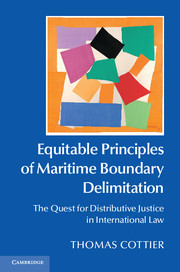 Equitable Principles of Maritime Boundary Delimitation
Equitable Principles of Maritime Boundary Delimitation Book contents
- Frontmatter
- Dedication
- Contents
- List of tables
- List of maps
- Preface
- Acknowledgements
- Table of cases
- Table of treaties and instruments
- Equity revisited: an introduction
- PART I Context: the enclosure of the seas
- PART II The new boundaries
- PART III Delimitation based on equity
- 8 The rule of equity
- 9 Conceptual issues and the context of equity
- 10 Justiciable standards of equity
- 11 The methodology of judicial boundary delimitation
- 12 The role of equity in negotiations
- Appendix I Maritime boundary agreements 1942–1992
- Appendix II General maps
- Bibliography
- Index
8 - The rule of equity
from PART III - Delimitation based on equity
Published online by Cambridge University Press: 05 May 2015
- Frontmatter
- Dedication
- Contents
- List of tables
- List of maps
- Preface
- Acknowledgements
- Table of cases
- Table of treaties and instruments
- Equity revisited: an introduction
- PART I Context: the enclosure of the seas
- PART II The new boundaries
- PART III Delimitation based on equity
- 8 The rule of equity
- 9 Conceptual issues and the context of equity
- 10 Justiciable standards of equity
- 11 The methodology of judicial boundary delimitation
- 12 The role of equity in negotiations
- Appendix I Maritime boundary agreements 1942–1992
- Appendix II General maps
- Bibliography
- Index
Summary
The rationale of equity and equitable principles
A. Corrective or autonomous equity?
We have found that the model of rules and exceptions based on equidistance has been fairly successful as a starting point in some 60 per cent of all delimitations. Yet, ever since the North Sea Continental Shelf cases, the courts have consistently adhered to the model of equity and equitable principles and denied equidistance as a rule of customary law, except for delimitations of the territorial sea. There is still considerable debate about the proper rules for maritime boundary delimitation: should equidistance or equitable principles be applied with a view to achieving an equitable solution? And, if equitable principles are applied, should this take the form of corrective equity or of an independent, autonomous function of equity in this field of law?
After UNCLOS III, this key issue of the Conference1 largely disappeared from the political arena. It mainly continues as a dispute within the legal community, involving fundamental issues of legal and regulatory theory. Different schools argue about which of the models is best suited to securing a peaceful settlement of the world's long-distance maritime boundaries. There is also debate over whether this goal should be pursued on the basis of strict rules or with a more open-textured approach. The problem is one of optimizing the level of precision and of the density and predictability of international law, and the chances of successful dispute settlement within a setting of highly individualistic configurations. The debate is therefore one that is of general importance to the theory of international law, extending far beyond the scope of maritime boundary delimitation. It is a structural problem of general interest to jurisprudence and legal theory.
Since 1969, the rejection of the equidistance–special circumstances model as a rule of general international law and the adoption of a more flexible approach based on equity, equitable principles and, today, on the basis of equitable solutions by the ICJ and courts of arbitration, has been controversial and the subject of profound criticism by both dissenting judges and scholars that adhere to the school of equidistance–special circumstances.
- Type
- Chapter
- Information
- Equitable Principles of Maritime Boundary DelimitationThe Quest for Distributive Justice in International Law, pp. 375 - 439Publisher: Cambridge University PressPrint publication year: 2015
- 1
- Cited by


